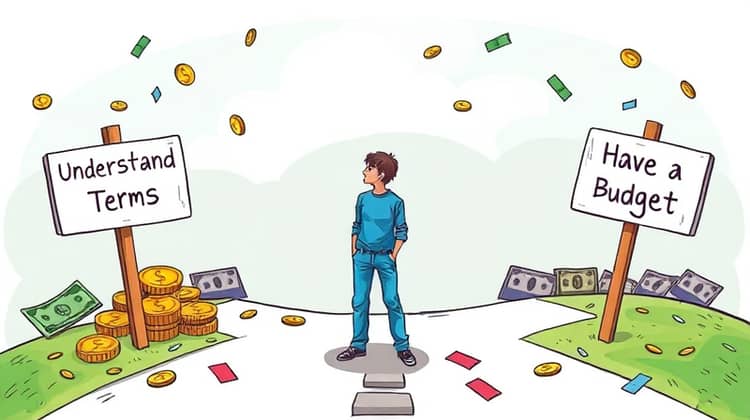Credit Cards and Big Buys: How to Spend Smartly Without Regrets

In today's consumer-driven world, the allure of big purchases often tempts individuals to use their credit cards without second thought. Credit cards can provide a sense of financial freedom and flexibility, but they can also lead to debt if not managed wisely. This guide aims to equip you with knowledge and strategies to use credit cards intelligently while making big buys, ensuring you don't fall into the trap of regret later.
By understanding the mechanics of credit cards, recognizing the psychological factors behind impulsive big buys, and committing to smart spending practices, you can enjoy the benefits your credit card offers while maintaining financial stability.
Understanding Credit Cards

Credit cards are a powerful financial tool that allows consumers to make purchases on credit, meaning you can buy now and pay later. They come with spending limits, interest rates, and various rewards systems that can influence how you use them.
However, the ease of swiping a card can lead to unnecessary spending, especially when it comes to larger purchases. It's important to comprehend how credit cards work, including concepts like interest rates, revolving debt, and minimum payments to make informed purchasing decisions.
- Credit limit: The maximum amount you can borrow
- Annual percentage rate (APR): The cost of borrowing on your card
- Rewards programs: Many cards offer points for purchases
- Minimum payment: The lowest amount you can pay per month without penalties
Understanding these basic terms can help you avoid costly mistakes and manage your credit card usage effectively.
The Temptation of Big Buys

Big purchases, whether it’s the latest tech gadget or a luxurious vacation, can be incredibly appealing. Credit cards can make these expenditures feel more attainable, leading many to buy things they might not otherwise consider within their budget.
However, this temptation can cause significant financial strain if the purchase is beyond one's means. It's essential to consider the long-term implications of charging a big buy on credit.
- Consider waiting 24 hours before making a big purchase
- Evaluate whether the item is a need or a want
- Assess your current financial standing and budget before buying
- Compare prices and shop around to find the best deal
These steps can help mitigate impulsive decision-making and ensure that your big buys are more planned and practical.
Smart Spending Tips

Smart spending is a skill that can save you a lot of money over time, particularly when using credit cards. It involves making conscious choices about your purchases rather than reacting to impulse or marketing pressure.
Here are some strategies to maximize your credit card benefits while minimizing the risk of overspending.
- Create a list of items you need before shopping
- Set a strict budget for big purchases
- Only use credit for high-value purchases you can repay quickly
- Review credit card statements regularly to track spending
Implementing these tips can help you maintain control over your finances while still enjoying the perks that come with credit card use.
The Importance of Budgeting

Budgeting is like a financial roadmap; it provides guidance on where your money goes and helps you allocate funds appropriately. When considering big buys, having a budget can clarify what you can afford and prevent you from overspending.
Creating a budget requires evaluating your income and fixed expenses, as well as planning for discretionary spending. This balance is crucial for responsible financial management, especially when credit cards are involved.
Additionally, budgeting enables you to set aside money for future large purchases, offering a more manageable approach rather than depending solely on credit.
Avoiding Common Pitfalls

Despite the best intentions, many still fall prey to common pitfalls related to credit card spending, particularly with big purchases. Awareness of these dangers can help prevent serious financial issues.
- Using credit cards without understanding the terms
- Failing to pay off balances in full, leading to high-interest accrual
- Not having a clear budget or financial strategy
Avoiding these pitfalls can greatly enhance your financial wellbeing and allow you to enjoy the benefits of credit cards more responsibly.
When to Use Credit Cards for Big Buys

Knowing when to leverage your credit card for larger expenses can make a significant difference in your overall financial health. There are specific scenarios in which using a credit card is not only acceptable but beneficial.
For instance, you should consider using credit cards for larger purchases when you have a solid plan for paying off the balance within a promotional period or when a card offers travel rewards or purchase protection.
- When you have enough savings to pay off the purchase immediately
- During a promotional APR period on purchases
- When making purchases that earn substantial rewards or benefits
- For emergencies where you do not have immediate cash available
Considering the right timing and circumstances for using your credit card can ensure that you reap the rewards without incurring debt.
Conclusion

Using credit cards for big purchases can be a double-edged sword. While they offer convenience and can facilitate desired acquisitions, they come with the caveat of potential debt and financial stress if not managed wisely.
However, by understanding the nuances of credit cards and following smart spending practices, you can enjoy the benefits of big buys without regrets.






